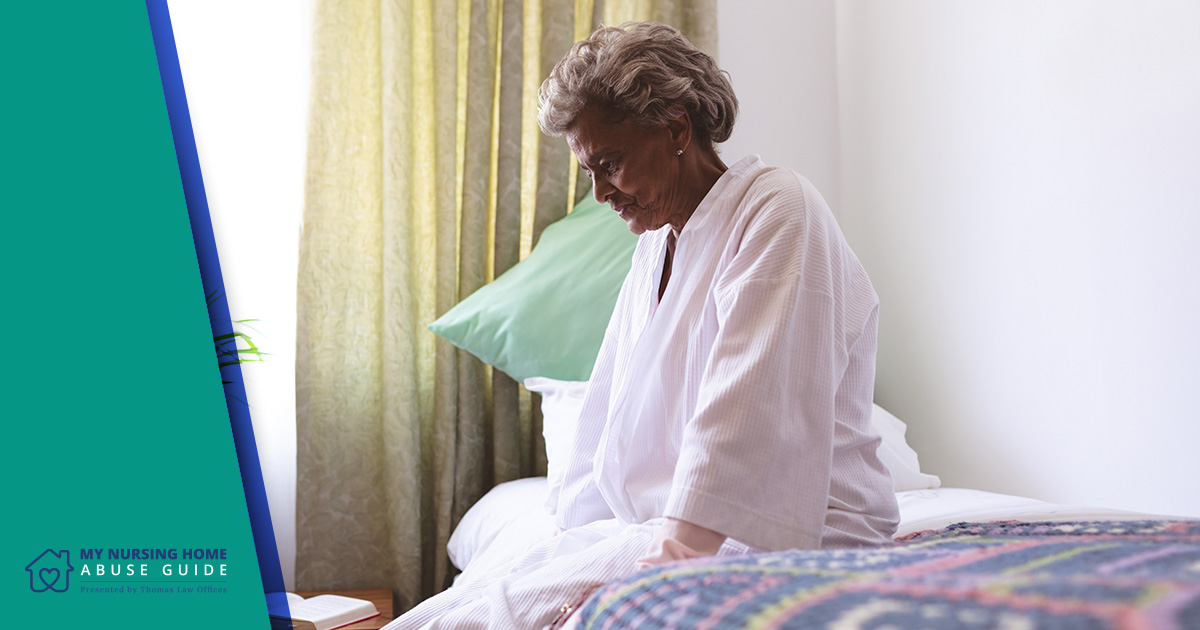Your Guide to Nursing Home Abuse & Prevention
Millions of elderly adults live in nursing home facilities.
Every one of them deserves to feel safe, protected, and respected.
Millions of elderly adults live in nursing home facilities.
Every one of them deserves to feel safe, protected, and respected.

Dementia is a medical condition that manifests as the loss of memory, struggles with language, inability to solve problems, and other thinking skills that become so severe that it interferes with daily life. Dementia can occur suddenly from a traumatic brain injury or gradually in patients who have been diagnosed with Alzheimer’s disease.
According to the Centers for Disease Control and Prevention, there is an estimated 4% of adults over the age of 65 have been diagnosed with dementia.
The concern with a dementia diagnosis is that the condition can progressively get worse. When that happens, the person suffering from the disease might no longer be able to make rational decisions about their care. Can a person with dementia refuse medical treatment?
The answer to that complex question depends on what they and their family set up before the disease took a turn for the worse.
A nursing home resident with dementia has the legal right to limit, refuse, or stop medical treatments. However, those determinations are typically made through advance directives, a type of legal contract that clearly stipulates the type of medical care that a person wants to receive once they no longer have the capacity to make those decisions on their own.
The individual resident can set up advance directives in conjunction with their families. These decisions are not easy ones to make.
It compels the family to think about the progression of the disease and what the end of life might look like for their loved one. Ideally, these directives should be set up as soon as possible after the diagnosis has been finalized.
Without advanced directives in place, it will become the family’s responsibility to make healthcare decisions based on what they believe the nursing home resident would want. This can often lead to conflict within the family if different members express opposing views on what the care should look like.
There are different types of advanced directives that can be established on behalf of a nursing home resident. The following advance directives have different levels of legality and standards.
A living will is a set of written instructions that detail the type of medical care a person wants to receive when it has been determined that extreme measures are necessary.
Those extreme measures include feeding tubes, hydration IVs, or intubation for breathing. A living will does not designate another person to make decisions on the person’s behalf. In other words, with a living will, the nursing home resident writes out their care details, and they become “activated” when the resident cannot make those decisions.
A family member can’t contradict the living will with their own wishes.
A durable power of attorney for health care allows the nursing home resident to designate a spouse, family member, or trusted friend to step in and make health care decisions when the resident is incapable of making those decisions.
Of course, the person who holds the power of attorney will undoubtedly have spoken with the resident in an effort to follow their wishes.
The goal of putting these directives in place is to avoid problems when extreme measures are required. That begins by keeping everyone informed about those decisions.
Once the advance directives have been worked out, signed and notarized, copies should be given to the following people:
Essentially, anyone who is part of the resident’s care team should have copies of these directives. As mentioned, these directives must be thoroughly discussed among the family. It might help to schedule a meeting with your loved one’s primary care physician to provide information about care options as the dementia progresses.
There might come a time when a resident with dementia fights back against treatment because of confusion. In those situations, experienced nursing home staff will know the best approach to administering care.
A nursing home facility is an optimum environment for residents who are coping with dementia. The kind of around-the-clock care provided in a nursing home offers peace of mind to families who want the best for their loved ones.
With advance care directives in place, the boundaries of that care will be clearly defined, and that is good for the resident and their family.
These are the kinds of questions you can discuss with an experienced legal team who can help you make the right decisions about the care for your loved one.
This website was created and is maintained by the legal team at Thomas Law Offices. Our attorneys are experienced in a wide variety of nursing home abuse and neglect cases and represent clients on a nationwide level. Call us or fill out the form to the right to tell us about your potential case. We will get back to you as quickly as possible.
866-351-2504